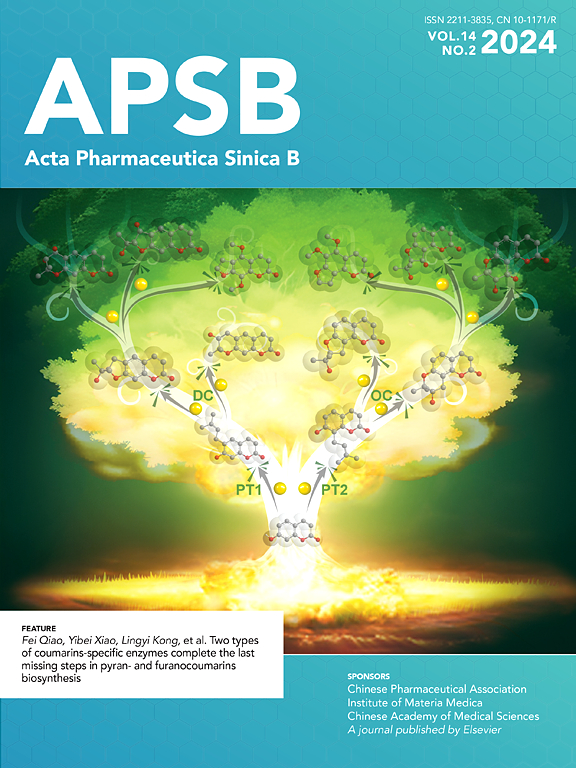Obesity–cancer axis crosstalk: Molecular insights and therapeutic approaches
IF 14.7
1区 医学
Q1 PHARMACOLOGY & PHARMACY
引用次数: 0
Abstract
Now recognized as a global health crisis, obesity has been linked to an increased risk of many types of cancer, including those of the breast, colon, rectum, uterus, gallbladder, and ovary. Obesity and cancer share several characteristics at the cellular, molecular, and epigenetic levels. Obesity is characterized by chronic inflammation of the adipose tissue (AT), resulting in genotoxic stress that further induces metabolic complications and contributes to the initiation and progression of cancer. The excessive accumulation of AT provides adipokines and lipids to engage tumor cells with stromal and immune cells to infiltrate carcinomas and secrete a plethora of cytokines, chemokines, and growth factors within the tumor microenvironment (TME) that contribute to carcinogenesis. Obesity also alters the metabolic reprogramming of immune cells, including macrophages, neutrophils, and T cells, thereby providing a suitable environment for the growth and progression of cancer. Obesity-associated metabolic dysregulation also perturbs the gut microbiome, which produces metabolites that can further increase the risk of cancer progression. This review will discuss links between obesity and cancer progression, including several crucial pathways that bridge the crosstalk between obesity-associated changes in AT inflammation, immune cells, adipokines, chemokines, and tumor cells to support cancer progression. We will also discuss our insights into the mechanisms by which obesity-driven factors influence metabolic reprogramming and touch base on how obesity mediates microbiome dysbiosis to alter metabolite and affect cancer progression. Altogether, this review highlights the crossroads of the obesity–cancer axis, describes its salient features, and presents possible therapeutic approaches for obesity-related cancers.

肥胖-癌症轴串扰:分子洞察和治疗方法
肥胖已被公认为是一种全球性的健康危机,它与多种癌症的风险增加有关,包括乳腺癌、结肠癌、直肠癌、子宫癌、胆囊癌和卵巢癌。肥胖和癌症在细胞、分子和表观遗传水平上有几个共同的特征。肥胖的特征是脂肪组织(AT)的慢性炎症,导致基因毒性应激,进一步诱发代谢并发症,并有助于癌症的发生和发展。AT的过度积累提供了脂肪因子和脂质,使肿瘤细胞与基质和免疫细胞结合,浸润癌细胞,并在肿瘤微环境(TME)中分泌过多的细胞因子、趋化因子和生长因子,从而促进癌变。肥胖还会改变免疫细胞的代谢重编程,包括巨噬细胞、中性粒细胞和T细胞,从而为癌症的生长和进展提供合适的环境。与肥胖相关的代谢失调也会扰乱肠道微生物群,肠道微生物群产生的代谢物会进一步增加癌症进展的风险。这篇综述将讨论肥胖和癌症进展之间的联系,包括几个关键的途径,这些途径在肥胖相关的AT炎症、免疫细胞、脂肪因子、趋化因子和肿瘤细胞之间的相互作用,以支持癌症进展。我们还将讨论我们对肥胖驱动因素影响代谢重编程的机制的见解,并触及肥胖如何介导微生物群失调以改变代谢物和影响癌症进展的基础。总之,这篇综述强调了肥胖-癌症轴的十字路口,描述了其显著特征,并提出了肥胖相关癌症的可能治疗方法。
本文章由计算机程序翻译,如有差异,请以英文原文为准。
求助全文
约1分钟内获得全文
求助全文
来源期刊

Acta Pharmaceutica Sinica. B
Pharmacology, Toxicology and Pharmaceutics-General Pharmacology, Toxicology and Pharmaceutics
CiteScore
22.40
自引率
5.50%
发文量
1051
审稿时长
19 weeks
期刊介绍:
The Journal of the Institute of Materia Medica, Chinese Academy of Medical Sciences, and the Chinese Pharmaceutical Association oversees the peer review process for Acta Pharmaceutica Sinica. B (APSB).
Published monthly in English, APSB is dedicated to disseminating significant original research articles, rapid communications, and high-quality reviews that highlight recent advances across various pharmaceutical sciences domains. These encompass pharmacology, pharmaceutics, medicinal chemistry, natural products, pharmacognosy, pharmaceutical analysis, and pharmacokinetics.
A part of the Acta Pharmaceutica Sinica series, established in 1953 and indexed in prominent databases like Chemical Abstracts, Index Medicus, SciFinder Scholar, Biological Abstracts, International Pharmaceutical Abstracts, Cambridge Scientific Abstracts, and Current Bibliography on Science and Technology, APSB is sponsored by the Institute of Materia Medica, Chinese Academy of Medical Sciences, and the Chinese Pharmaceutical Association. Its production and hosting are facilitated by Elsevier B.V. This collaborative effort ensures APSB's commitment to delivering valuable contributions to the pharmaceutical sciences community.
 求助内容:
求助内容: 应助结果提醒方式:
应助结果提醒方式:


